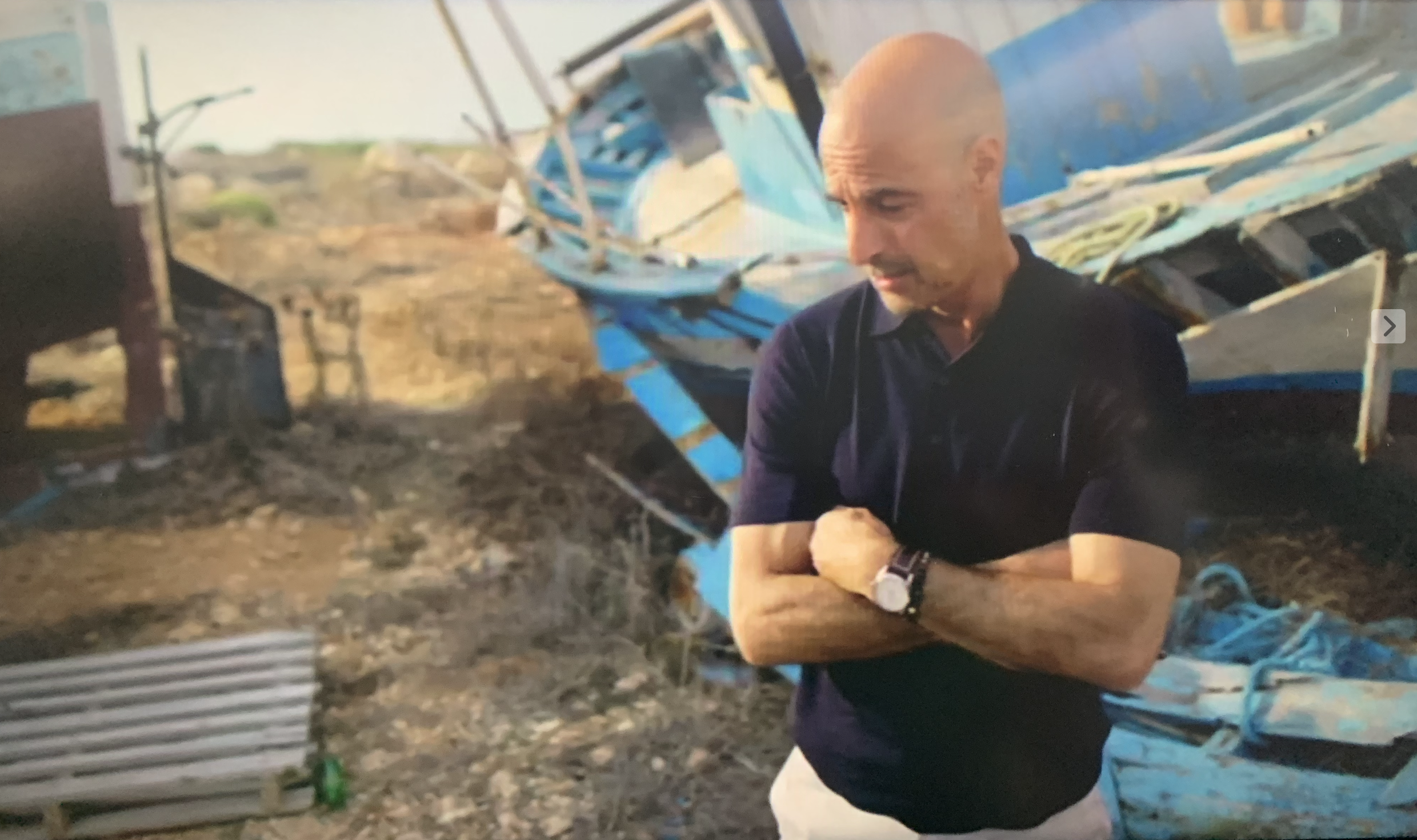Stanley Tucci’s Woodenboat Graveyard
By Sal Balharrie
Stanley Tucci on Lampedusa.
Perhaps it’s just amongst the boats we sail upon - but is it possible to draw a line of comparison between a love of old boats and a love of good food?
Is it’s as simple as an appreciation for the finer things in life – be that the shape of a hull or a perfectly cooked piece of fish; a finely laid teak deck or the perfection that is freshly shelled broad beans eaten with a snapped off end of pecorino?
There’s also the sharing of meals. It could be argued that the best part of a regatta is not the weight of collecting a trophy at the end of a good day out on the water, but the sliding of chairs, around a table, to share in a very long, slow, bbq dinner, overlooking a marina, while our music carries out on the breeze and someone searches for another bottle of red - and another.
As a teenager, the American actor Stanley Tucci, along with his family, spent a life changing year living in Florence. His father, an Art teacher, his mother a curious home cook and Stanley, a cultural sponge, found himself with time and freedom to explore a city of incredible food. While Tucci was to find creative expression and a career as an Actor, Italy gave him a profound connection to family and friends in a kitchen, around a table, preparing and sharing food.
Here’s a new show to add to your list. STANLEY TUCCI’S IN SEARCH OF ITALY. I came across it on a recent QANTAS flight. You too can watch it via a YOU TUBE subscription.
Each episode takes us to a different region, chatting with food producers, chefs, restaurateurs, historians, winemakers, locals, guides, and other experts as Tucci explores various aspects of Italian life revolving around food-centric culture.
I watched episodes about Rome and Tuscany and then Sicily, a place I know very little about, particularly Lampedusa.
“Tucci visits the southernmost part of Italy, Lampedusa, a seafaring island off the coast of Sicily known for its colorful beaches. He meets with a sardine fisherman, Beppe Billeci, and his wife, Rina, and they chat over a rustic dish of sardines in salsa verde and Sarde a beccafico (butterflied shrimp with breadcrumbs, raisins and herbs.”





So while I’m sitting at 35,000ft, watching Tucci devour sardines, the place he visited next, grabbed my attending. There on a rocky beach, a ‘boat graveyard’ – a sandbank of discarded, impounded wooden boats. Lying stranded, some quite beautiful, makeshift craft, roughly hammered together, some cut down from bigger vessels, working wooden boats used by migrants to cross the waters from Africa in the hope of a better life. Here and there a shoe, a life jacket, a nappy.
Lampedusa, a small islet roughly equidistant from Southern Sicily, Malta and Tunisia. In recent years, it’s found itself at the heart of Europe’s refugee crisis. As mayor, Nicolini has stood out from her colleagues by campaigning to ensure that the island deals as efficiently and humanely as possible with the migrants and refugees fleeing war-torn Middle Eastern countries by sea. In campaigning across Europe to ensure better funding and faster visa processing for refugees and migrants, Nicolini has made Lampedusa a rare (though controversial) bright spot on a continent where hostility to even desperate migrants, partly manufactured by the media, has grown.
Lampedusa Mayor Giusi Nicolini (right), awarded for her work with migrants, meets Italy's then-Integration minister Ceclie Kyenge in 2013.
Antonio Parrinello/Reuters
The crisis Nicolini and her fellow islanders face is not a small one. According to the International Organization for Migration, 649 migrants died or went missing in the Mediterranean in the first three months of 2017 alone, following years of high death tolls.
In 2017, for the first time ever, the UNSECO’s peace prize went to a mayor and her island : 56-year-old Giusi Nicolini, mayor of Lampedusa.
“I pledge this award to all those who did not manage to cross the sea because they ended up beneath it.”
And then back to food.
The Sicilian journey ends with a heartwarming visit to a family, two theater actors, Emanuela and Mimmo, who foster migrant orphans in their home, explaining to Tucci people think that it is they who are being kind, in opening their home to migrant-orphans, but they know and believe it is they, the parents, who are the fortunate ones, it is their lives that have been made so much more rich by inviting these kids, who survived the sea, in wooden boats, and arrived in their lives.
Food and woodenboats. Indeed.
//
References for this article:


